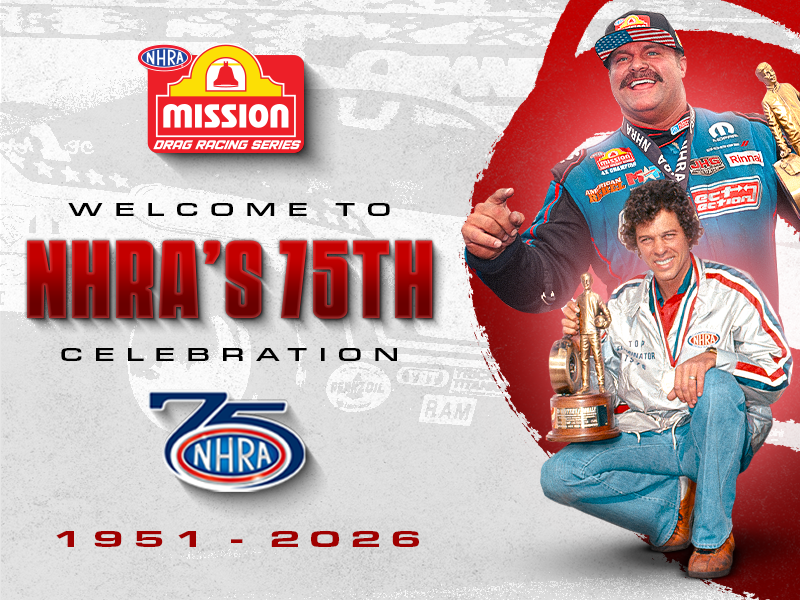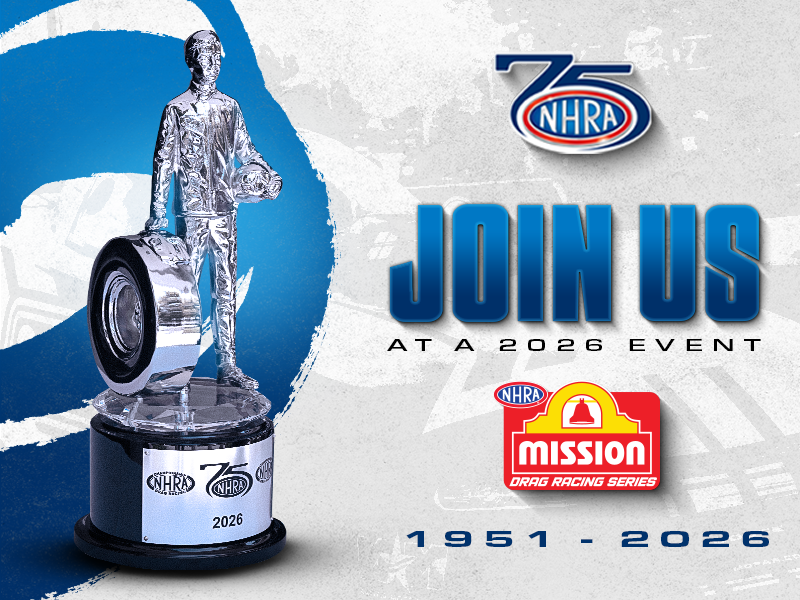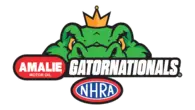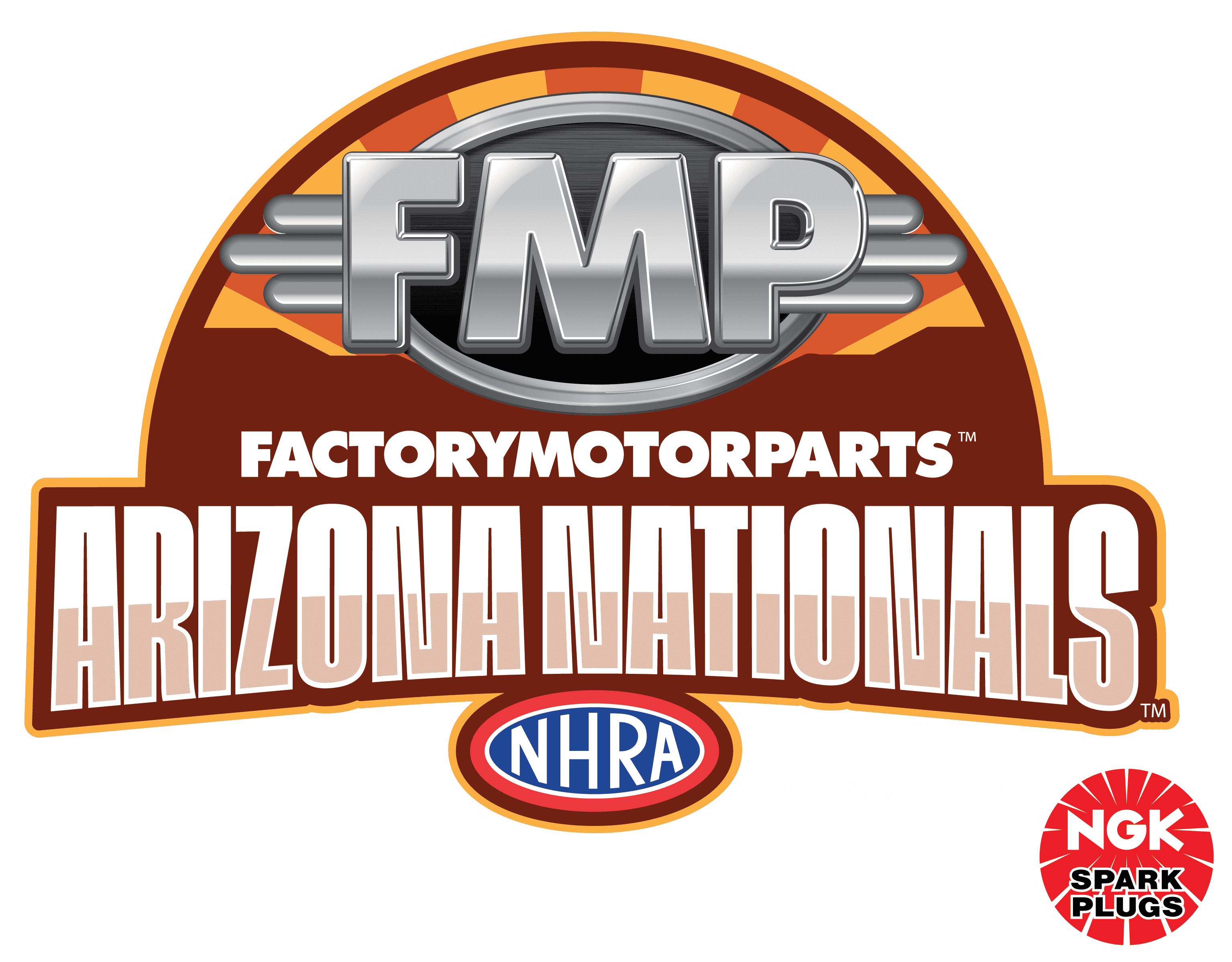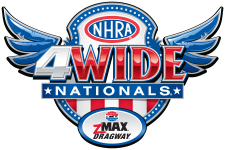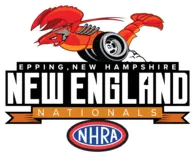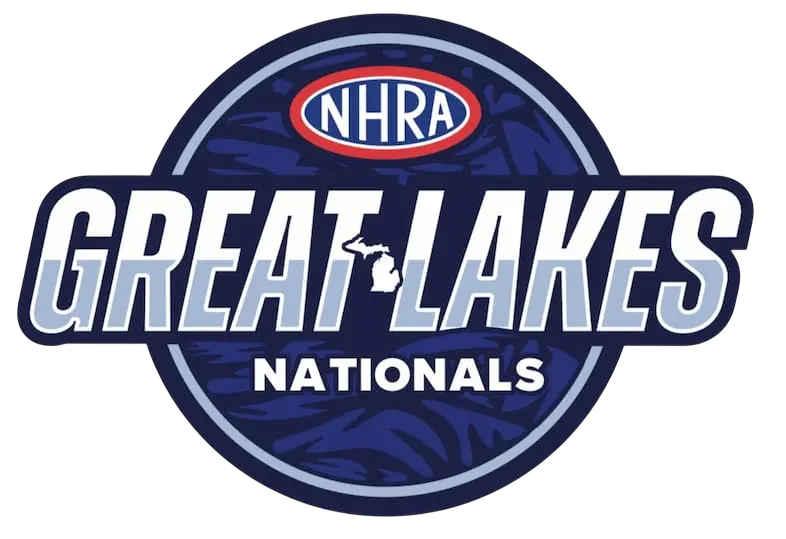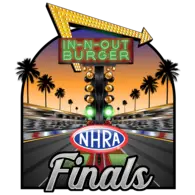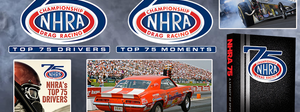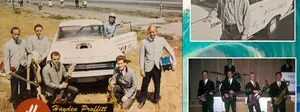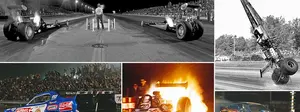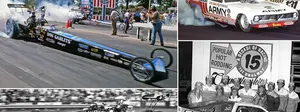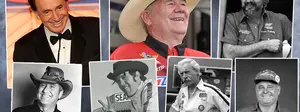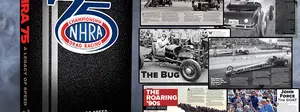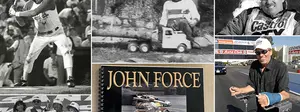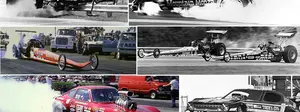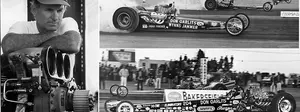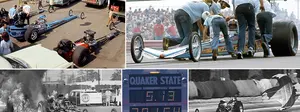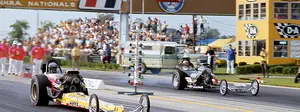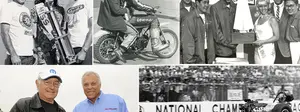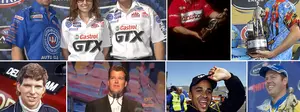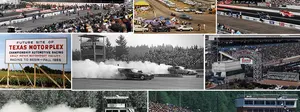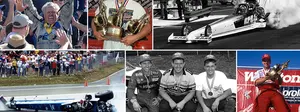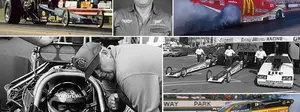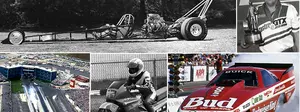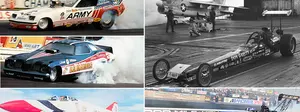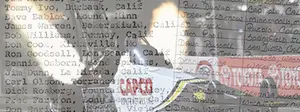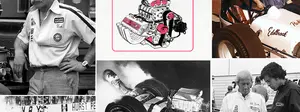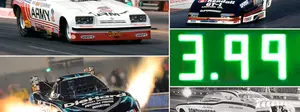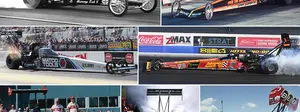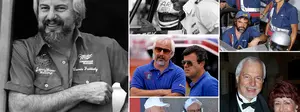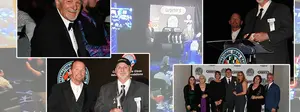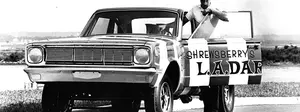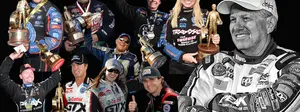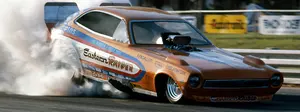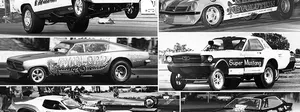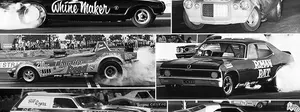Remembering Dick LaHaie
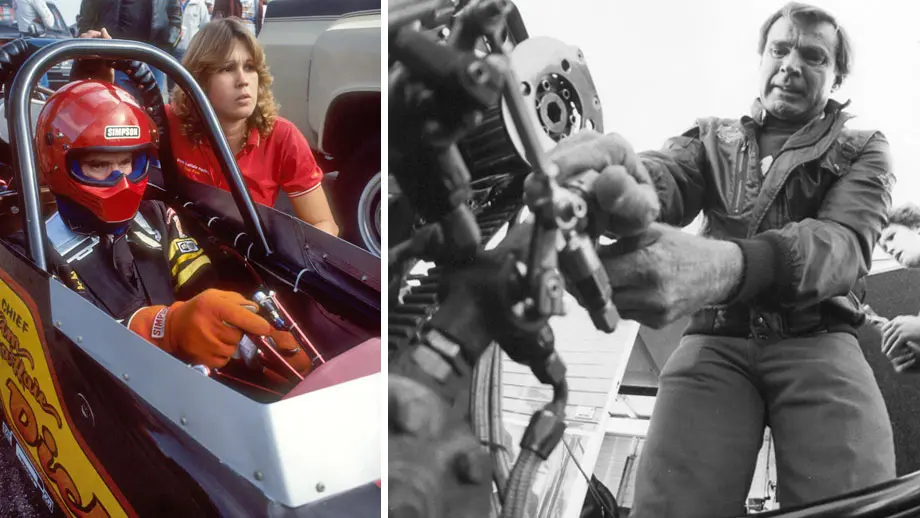

A lot of former Top Fuel and Funny Car drivers have gone on to become successful crew chiefs, but there aren’t a lot of guys in NHRA nitro racing’s history who not only won a championship as a driver but then used their mechanical skills to tune other drivers to world championships. Then there’s Dick LaHaie, whom we lost Wednesday, who won the crown as a driver then tuned not just one but two drivers to a combined four Top Fuel championships after he left the cockpit.
The 1987 NHRA Top Fuel champ, who had been in the class since the mid-1960s earning a reputation as a cagey driver/tuner who could do the most with the least, hung up his driving gloves in the early 1990s and earned a second huge dose of respect when he returned to the sport as a crew chief in 1993 at Kalitta Motorsports, where he wrenched Scott Kalitta to championships in 1994 and ’95, and a few years later, repeated the trick with driver Larry Dixon in Don Prudhomme’s Miller Lite dragster in 2002-03.
Much like Tim Wilkerson today, LaHaie was a man of the people because he did it all and did it with less. Tim might have Wilk’s Warriors but Dick-o surely had LaHaie’s Legion. In the mid-1980s, with a small crew that usually just included his daughter Kim (and, later, son Jeff), they more than held their own against the higher-funded and larger teams of guys like Joe Amato and Gary Ormsby. I got to interview him a lot during the 1980s, and even though he always seemed to have 20 things on his to-do list, he made the time to answer questions (though he clearly was disdainful of stupid questions; we came prepared!) and was always a staff favorite.
While you can read a more detailed account of his career here, I thought I’d remember him today with some photos from the National Dragster collection, and the memories of some of those closest to him.

LaHaie got his start in Top Fuel in 1964 with Noah Canfield and Charlie Johnson and later fielded his own car. This is 1970, the year he won his first UDRA championship, racing against “Sneaky Pete” Robinson.

LaHaie built all of his own cars at Wayne Farr's shop in Lansing, Mich. He built his first rear-engined car in 1972 and every car he raced up through and including his 1984 car. This is from Englishtown in 1973, when he won his second UDRA title.

This is a cool photo for a number of reasons. It’s round one at the 1975 Winternationals, and LaHaie is driving the car he ran with well-liked fellow Michigander Bob “Pancho” Rendon. They’re racing Shirley Muldowney, who had earned her license two years earlier in Rendon’s own car. It was just Muldowney’s third NHRA race in Top Fuel (having run Columbus and Indy in ’74) and Kalitta undoubtedly was tuning for her. Despite her lead, LaHaie came back to win this round, 6.20 to 6.33.
The rest of 1975 did not turn out so well for LaHaie. He shelved the Winternationals car, which was too heavy, and built a new one for the Gatornationals but the car was destroyed in a crash during qualifying when the throttle stuck open. LaHaie did the only thing he could, shoving in the clutch to blow the engine, but the car veered out of control and crashed heavily. LaHaie’s right arm was broken but, much worse, his left hand was severed in the wreck but, in an incredibly serendipitous collision of fates, a group of medically-trained Vietnam veterans was in Gainesville teaching limb replacement and were able to assist in having the hand successful reattached.
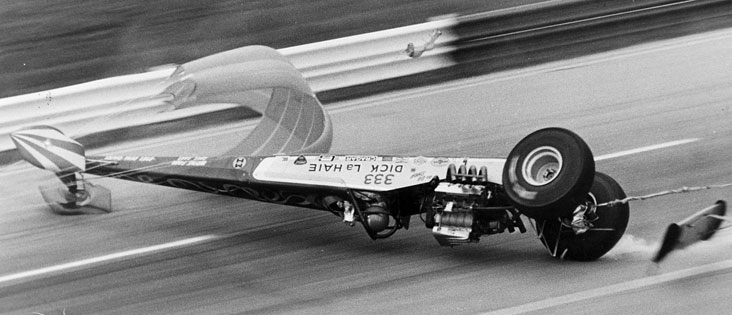
LaHaie had a new car built and debuted it at U.S. 30 Dragstrip a week before the U.S. Nationals and won the event, but on his third qualifying run in Indy, the left rear tire started to go away on a 236-mph pass. "I felt it shudder as it was coming up to the lights, like it was wadding up on itself,” LaHaie told me in a 2012 interview. “It blew the inner liner, and the tire got all crazy, and over it went. There wasn’t anything I could do about it." LaHaie lost three toes (two of which were successfully reattached) and broke his right arm again in the accident. A month after the wreck, LaHaie decided he was going to race again, and Marv Rifchin, founder and president of M&H Tires, cut him a check for a new Top Fueler. LaHaie had nerves (and, obviously other parts) of steel.

I love this shot. It’s LaHaie in 1980, wearing a Shirley Muldowney t-shirt. The 1980 season was the first time that LaHaie cracked the Top 10 points standings, finishing fifth after scoring his first career win in Englishtown.
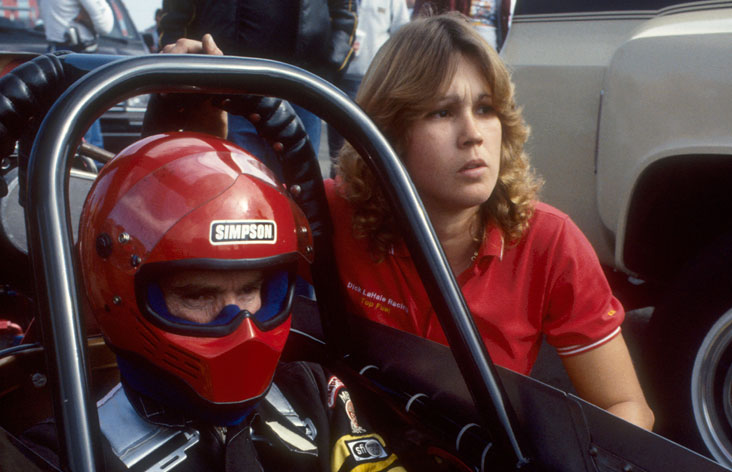
Daughter Kim joined the team in 1982 and became the most prominent and celebrated female mechanic in the sport since the great Alison Lee. Even though her dad listed her on the car as “crew chief,” in an interview earlier this year with ND’s Jake Sundstrom, she said, “I don’t know if I even look at the role as being the crew chief, to be honest; him and I just worked together side by side. To me, working on the race car was just second nature. It was something I really enjoyed. I learned a lot with him and from him, and it was a lot of fun. Back in those days, it was a lot of hard work. There were quite a few years where it was just the two of us, but we made it happen.”

The 1987 championship car, shown in mid-burnout in Phoenix, where he and Kim won their fourth and final race of the season.
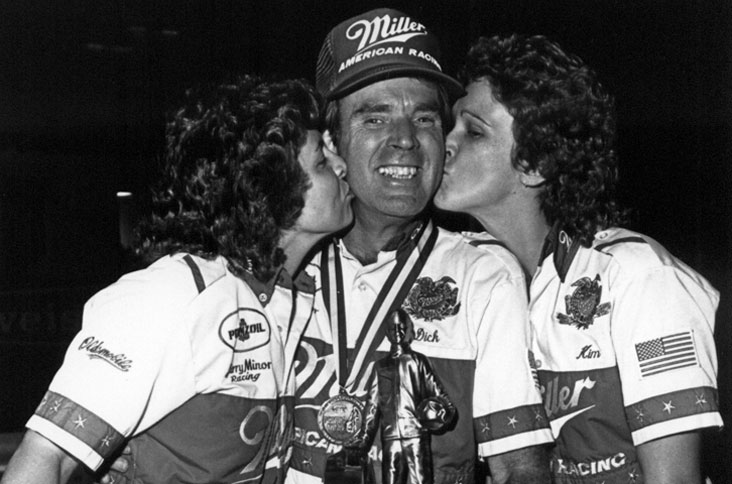
LaHaie was congratulated by the two amazing women in life, wife Claudia, left, and Kim, after he won the 1987 event in Reading.

The 1987 championship battle came down to the World Finals in Pomona, where LaHaie put it away by personally defeating his closest rival, Joe Amato, in the semifinals, leading the team to post this sign in their pit. It’s worth noting the late Bob Brooks, of clutch manufacturer AFT, standing in the trailer door; he was instrumental to their championship and a longtime close friend of LaHaie.
LaHaie met Brooks in the 1970s when he was a customer of (and sponsored by) Brooks Racing Components and LaHaie was later AFT’s first customer. “I ran the first clutch he ever made –- it was a spring-style like they use in Alcohol Dragster –- at an NHRA race in Tulsa [Okla.] in 1986,” LaHaie told me in 2014. “I said ‘Bring your clutch and everything we’ll need and bring plenty of it because I’m going to turn that thing into a potato chip every time it goes down the racetrack.’ Lo and behold, it was a nice clutch, and I won the championship the next year with one of his centrifugal clutches."
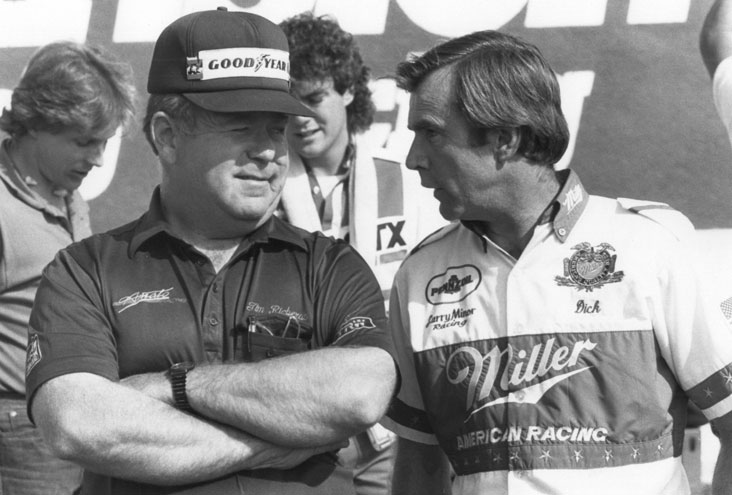
Despite their rivalry in 1987, LaHaie had a great relationship with Amato’s tuner, Tim Richards. Years later, they became family when Kim and Tim got married.
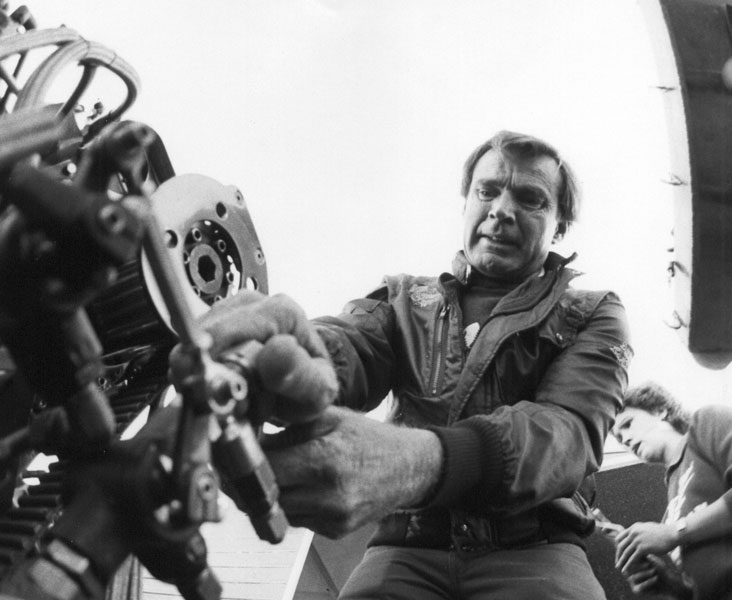
Great low-angle shot of LaHaie working on the fuel pump, with Kim in the background probably headed off to the clutch, which became her specialty.
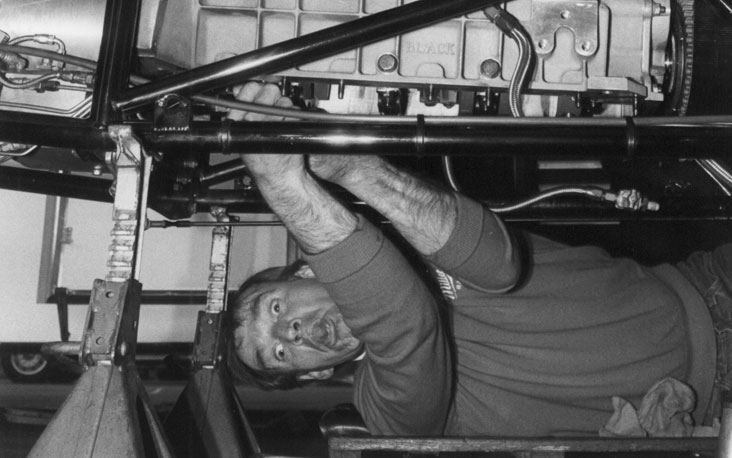
Did he also do his own bottom end work? Of course he did his own bottom end work, and had some fun with our photographer in the process. This is from 1988, the year after his championship, and nothing had changed in his work ethic.
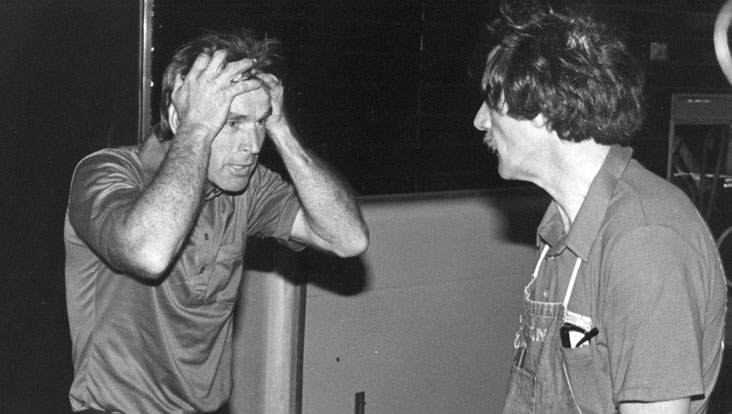
Another classic LaHaie photo from the files. I’m not sure what he was so stressed out about here, but I love the shot.

The 1991 season was the last behind the wheel for LaHaie, who got some financial assistance from Canadian donut king Tim Horton, but not enough to stay in business. He still finished in the Top 10 (9th) for the ninth time in 11 seasons.
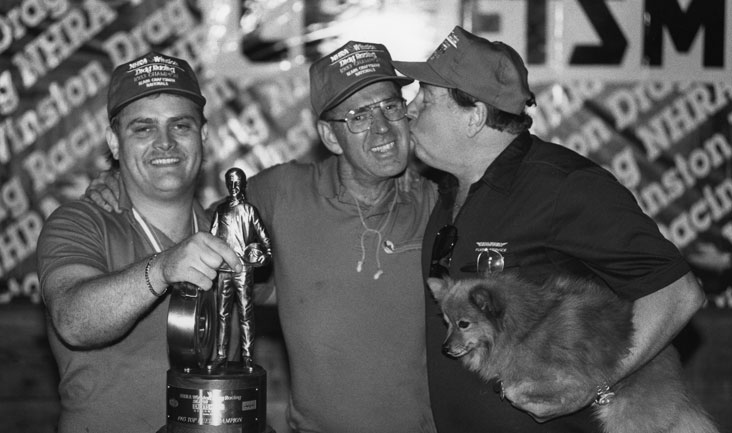
It didn’t take LaHaie long to turn Scott Kalitta into a championship contender, winning with his in Topeka in 1993 not long after joining the team, which earned him another kiss, this one from Connie. The senior Kalitta issued a statement after LaHaie’s passing, saying, "The drag racing community has lost a good man and a true pioneer of our sport. Dick made such an impact on Kalitta Motorsports, the NHRA as a whole, and me personally. He will be truly missed."

En route to Scott's first championship in 1994, the team won four straight races -- Columbus, Topeka, Denver, and Sonoma -- and Dick and Claudia and Scott celebrated together in the Sonoma winner's circle.

After he left the Kalitta team, LaHaie tuned for another legend of the sport, Don Prudhomme, from 2000 through his retirement in 2005, and wrenched Larry Dixon to back-to-back titles in 2002-03. Brooks was also very instrumental in getting LaHaie hired there.
“I was working for Doug Herbert then,” LaHaie told me, “and Brooks was working with [Dale] Armstrong over at ‘Snake’s,’ but they were going to work on Prudhomme’s Funny Car. Brooks said I at least needed to talk to Prudhomme about it, so I went over and talked to ‘Snake’ and told him I didn’t think it would work because I never liked him; he just rolled his eyes and said, ‘I never wanted to go to dinner with you, either.’
"We went our separate ways, but later that season, I went to work for them at Reading, just to watch the car run. On Monday, I asked them to change the car to run it my way: less nitro, some more compression, and my clutch settings, and the car went right down the track with really good numbers. ‘Snake’ got the crew guys together and told them, ‘This is going to be short and to the point, and I want you to listen very closely to what I’m saying. If Dick LaHaie says tomorrow is Easter, start coloring the eggs.’ We had a helluva run together.”
Prudhomme, too, had nothing but kind words for LaHaie.
“There was a period of time there that he was the best I’d ever seen,” said Prudhomme. “He knew more about burning a drum on nitro than anyone. I admired him long before he came to work for me, when he had his own car and used to run it with his daughter. It really bothered him to tear up parts and, as a team owner, I really loved him because he could run the thing without blowing the blower off it. He was a great tuner and ended up being a damn good friend. Guys like him and Dale Armstrong did a lot for the sport; they were pretty amazing. Having a guy like him who, win, lose, of draw gave you everything he had, meant a lot to me.”
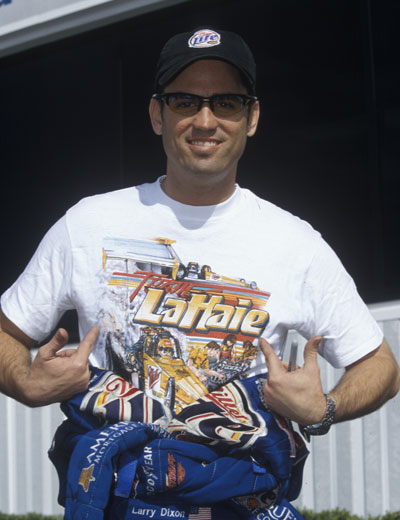
More than a dozen years after worked together, Dixon and LaHaie also remained close, talking at least once a month on the phone.
“He was as close to being my dad as he could be without being my dad,” said Dixon, who first worked with LaHaie in 1987 when they were both part of Minor’s multi-car team. “This sucks.”
With two great mentors like Prudhomme and LaHaie, Dixon learned everything a guy could learn. Prudhomme taught him the ropes and LaHaie helped apply the finishing touches.
“When Dick came to our team, he told us we could win the championship but we weren’t going to do it right out of the gate,” remembered Dixon. “We were going to have to learn how to race and how to win. The first season we finished third, the next season we were second, and the next season we finished first. Dick wasn’t interested in what the latest trick part was; he wanted a proven product and then would do a better job refining the setup than anyone else to get the most out of it.
"The story I always tell people about Dick is that I was the first guy to run a 4.40 [elapsed time], with Armstrong tuning in 1999. Dick came on board at the end of that year and I didn’t run another 4.40 until 2005, but do you know how many races I won without running a 4.40? [I do; 30.] We were going down the track almost every run and I loved that. It taught me so much.”

LaHaie remained an occasional visitor to the races after he retired, visiting with Kim in 2007 when she worked with Richards on the Budweiser Top Fuel team, with Connie Kalitta that same year, and brought his magnificent Crossley to Gainesville in 2011, where he was saluted on the starting line. Health issues in the following years restricted his ability to travel and he underwent a lung transplant in 2015.
Despite his passing, LaHaie will still hold a firm place in our hearts and memories. His family-won championship (as part of the Larry Minor organization) was one of the last of its kind. He came from an era when the driver and mechanic were usually one and the same (although subsequent champs like Del Worsham still liked to get their hands dirty while driving), but LaHaie was a modern throwback who still did both on the verge of the chasm that soon separated the driver from many mechanical responsibilities. He was a guy who could -– and did -– do it all. He’ll be missed.
Phil Burgess can reached at pburgess@nhra.com



